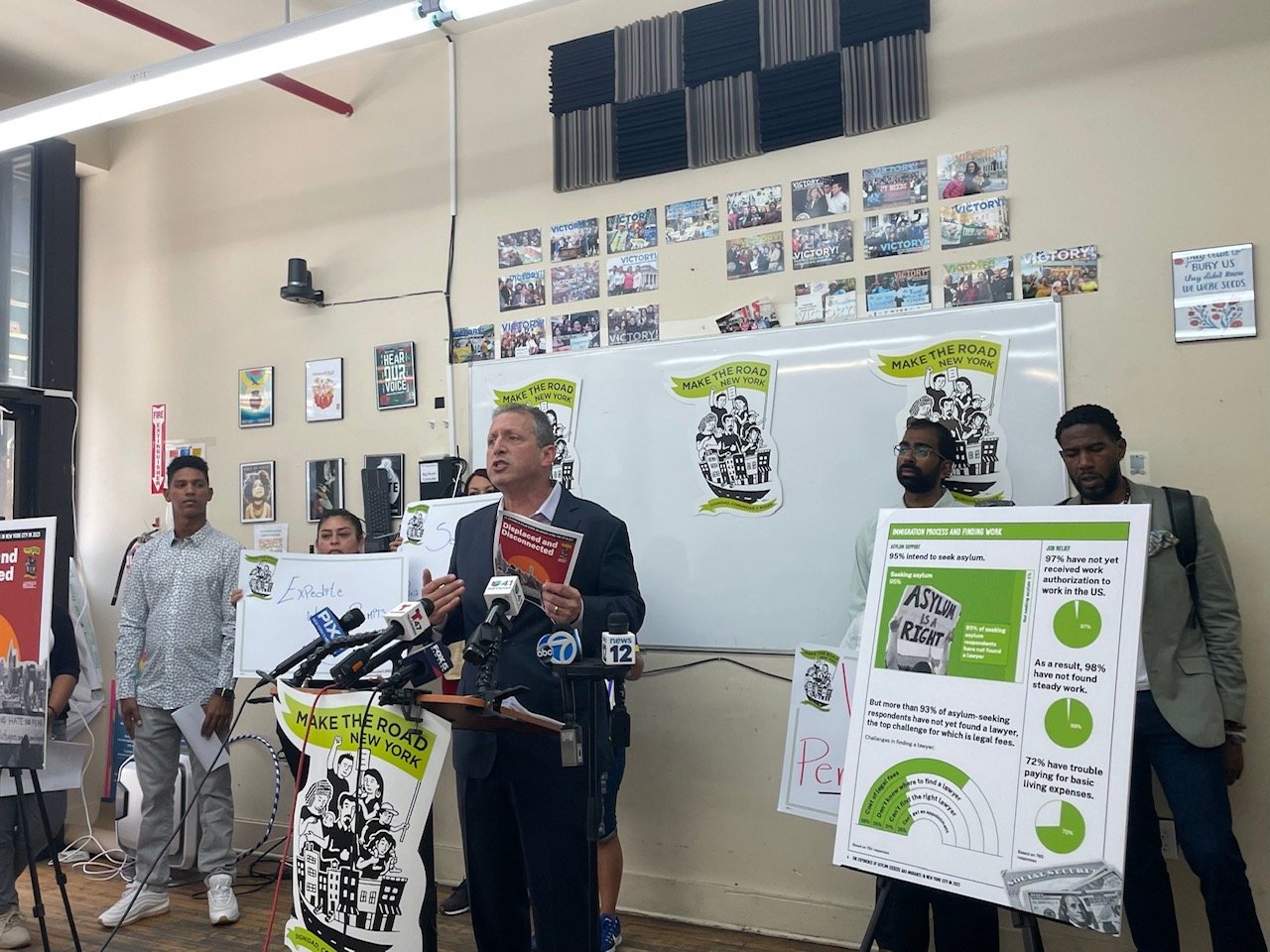Report finds asylum seekers struggle to cover legal fees, find work
/A new report conducted by Make the Road New York found that newly arrived migrants overwhelmingly are having difficulty covering the legal fees required to apply for asylum and get work authorization. Public Advocate jumaane williams/twitter
By Ryan Schwach
A recently released report from immigration non-profit Make the Road New York, surveyed nearly 800 of the approximately 70,000 recently arrived migrants about what resources they say they need the most, with the majority saying they can’t afford legal fees to actually obtain asylum or find work.
The report, titled “Displaced and Disconnected,” surveyed 766 recently arrived migrants in the city, 95 percent of which are currently living in shelters, and 65 percent of which are Venezuelan.
Around 95 percent of the respondents said they intend to legally seek asylum in the United States, and 93 percent cannot currently afford to move out of the shelters where they currently reside.
“What we saw was people coming looking for a better quality of life,” said Natalia Aristizabal Betancur, the executive director of Make the Road New York.
According to the report, the majority of the migrants surveyed have had a difficult time getting up on their feet since arriving in New York City, because they cannot afford the legal fees which are needed in order to actually apply for asylum. Without being able to send that application, they are unable to acquire work authorization to move out of a shelter, they said.
“As the comptroller of the City of New York, as the chief financial officer, I'll tell you, it is profoundly short sighted of the city because the most immediate thing we could do to help people move out of shelter, which is very expensive, is to provide legal representation and support general people get work authorizations and jobs so they can move out of shelter,” said Comptroller Brad Lander, standing alongside other advocates in Queens on Tuesday. “It's just not happening very much because we have not stepped up to provide this. It is a new challenge for the city. But this is an urgent challenge at the moment.”
The report says that 93 percent of respondents have been unable to find a lawyer, with 68 percent citing legal fees as the reason they have been unable to obtain one.
Advocates in Queens on Wednesday said that the city should divert resources to help pay for the legal fees of asylum seekers in order to get them out of shelters, and off the city’s dime, faster.
They specifically called for at least $70 million in investment for legal fees.
“That investment will save hundreds of millions of dollars,” said Lander, who said that legal fees were the least provided resource to asylum seekers in this year’s proposed budget.
“[Around] 0.2 percent has gone to provide the legal services and the case management and the support that will help people file their asylum applications, get their work authorization six months later and get employment and get on their feet so they can move out of shelter,” he said. “One of the top things that folks need most of all is the thing that we have done the absolute least to provide.”
Lander was joined by Public Advocate Jumaane Williams and Queens Councilmember Shekar Krishnan in calling for the investment.
“I think what we're seeing and what this report highlights so powerfully to New York, is that we are not facing a crisis of asylum seekers, we are facing a crisis of systemic injustice,” Krishnan said. “We are facing a crisis of structural problems that we need to address in the state once and for all.”
“We need permanent pathways to employment and legal services,” he added.
Employment and work authorization has been a hot button issue related to the migrant crisis, with Mayor Eric Adams, councilmembers, congress members and others calling on the federal government to shorten or eliminate the 150-day waiting period for asylum seekers to obtain work authorization.
In the report, 97 percent of respondents have not yet received work authorization, and 98 percent have not found steady work at all, which has led to most being unable to move out of the shelters and pay for basic needs that aren’t provided by the government.
“I don't have a job at the moment, and everyone tells me that I need a permit to work, which I hope to have that permit soon, so that I can work and give my family a better quality of life,” said Jesus, a asylum seeker from Venezuela who arrived in the city just 21 days ago and spoke on Monday. “We are currently living in a shelter and we don't have a place to cook. We are receiving the food that the city gives us, for which we are grateful, however it worries me to see that my daughters have lost weight.”
“I have not been able to receive any legal advice regarding my case, and I hope to be able to access help soon,” he added.
Williams argued it is important to not pit asylum seekers against native New Yorkers struggling in the city’s shelter systems as well.
“We don't want to have people in need pitted against other people in need, that has no way to lead to a humanitarian crisis,” he said.
Jesus said he hopes to stay in New York City, a sentiment he shares with 67 percent of survey respondents, who said they would choose to live in New York, even if they could live somewhere else
“I’m hopeful that I’ll be able to build a better and safer future for my family here,” he said.




